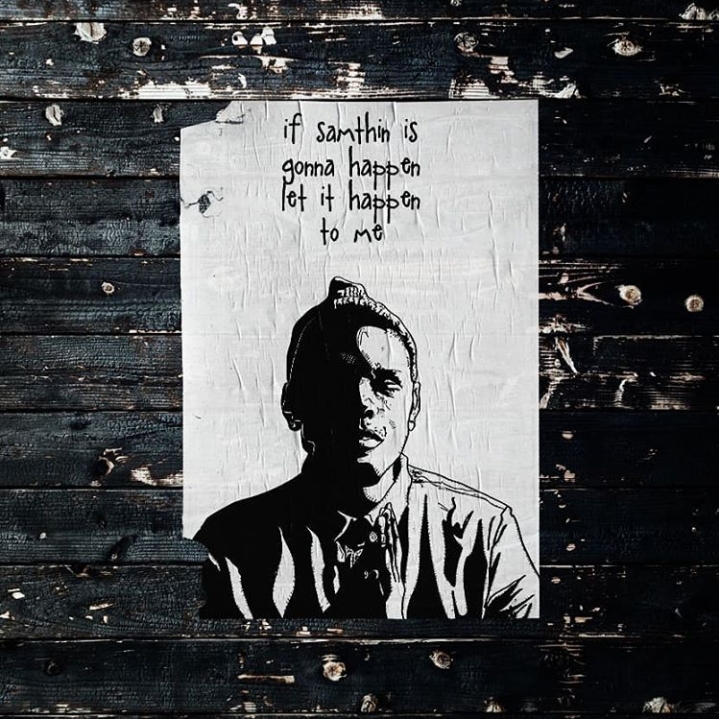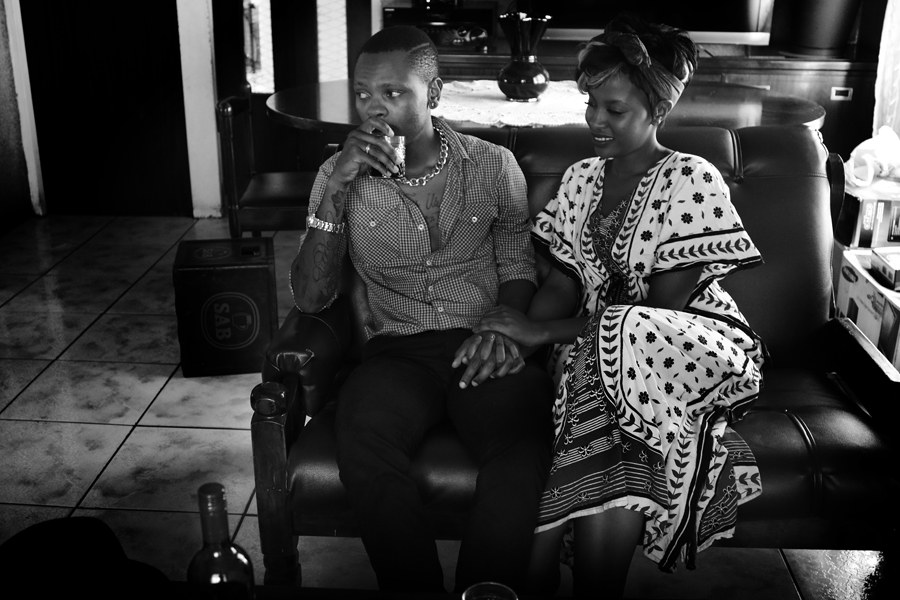“A classic is a work which relegates the noise of the present to a background hum, which at the same time the classics cannot exist without… a work which persists as a background noise even when a present that is totally incompatible with it holds sway.” – Italo Calvino
A conversation about whether Samthing Soweto’s debut album Isphithiphithi is the 2019 album of the year is truly one without frills. We all know by now that it made history by being number one on Apple Music along with the Akulaleki single strictly from pre-orders; we also know that all tracks in the album debuted on the Apple Music Top 40 at its official release; we know that about a week later, four of the tracks dominated the Apple Music top 10. We know all these facts and more about Isphithiphithi; the question is therefore not if the album is the 2019 album of the year, as this is without question; the relevant enquiry however, is if this magnum opus will find its own place on History’s tongue along with Miriam Makeba’s Pata Pata (1967), Brenda & the Big Dudes’ Weekend Special (1983), and TKZee’s Halloween (1998).
To answer this core question we need to examine Isphithiphithi to its fullest, putting it through the Classic Test, identifying if it fulfills the factors that make a Classic.
The Classic Test includes:
-Transcendence
-Consummate and coherent enactment of intent and narrative
-Dominance
-Nuanced impact on culture and genre
-Definition of an era
-Definition of the Artist
-Replay value that invokes the identical potency from first listen to later decades
-Masterful production, mixing, and mastering
All these are factors that determine an album that stands the test of time regardless of any rubric; these are elements dictating -- timelessness.
Transcendence:
Samthing Soweto structured Isphithiphithi in such a way that particular songs are etched into the skin and flesh of South African culture through some of our most momentous days. Azishe, a song about struggle and land, stands stout with its fist in the air next to classic protest lamentations like Mabawuyeke, puncturing the atmosphere on days like April 27, June 16, and every other strike. Omama Bomthandazo ft. Makhafula Vilakazi sits next to 2 Pac’s Dear Mama and Boyz II Men’s A Song For Mama and enjoys the aroma of a home cooked meal on Mother’s day. Nodoli extends its arms as an ode and joins Baby Face’s The day that you gave me son in cradling the experience of childbirth for a father. Uvalo, Thanda Wena Pt.2 with Kabza De Small ft. Shasha, Umuhle Uyasabeka, Isphithiphithi, Lotto ft. Mlindo The Vocalist, DJ Maphorisa & Kabza De Small, and AmaDM ft. DJ Maphorisa, Kabza De Small & MFR Souls huddle up with a plethora of exceptional love songs like Mafikizolo’s Emlanjeni to assemble a bouquet gifted to every lover on Valentine’s Day or any day a lover chooses. Uthando Lwempintshi Yakho sneaks itself in to hide next to infidelity hymns like Nelly and Kelly’s Dilemma. Happy Birthday invites the Happy Birthday To You anthem to a game of seesaw, and makes itself present on every birthday. To close it off, Akulaleki ft. Sha Sha, DJ Maphorisa & Kabza De Small mounts the speaker next to the primary national anthem, Mgarimbe’s Sister Bethina, and Ntando’s Nono in ushering patrons out of clubs and parties.
Samthing Soweto has strategically woven the colourful hue of Isphithiphi into South Africa’s cultural fabric, as to whether this will be one of our favourite garments for years to come remains a moot status to be concluded by time.

Consummate and coherent enactment of intent and narrative:
The composition of an album is absolutely analogous to that of a novel; structurally a good album needs to embody a sort of systematic or sustained narrative, its text needs to beam brevity and clarity, in its completion the artist’s constructional intention needs to be coherent and concise – this goes into the track listing like chapters in a novel, and precision in the production choice for each chapter. Samthing Soweto purposefully separated Isphithiphithi into three chapters, each chapter winged by its own music production plumage.
Chapter 1:
Raised by a single mother, Samthing Soweto places his monarch as the motif of this chapter. The album opens naturally with a prayer, Ngisebenzela Nina, a lamentation introducing us to the chaos (Isphithiphithi) in our everyday; this intro is a conversation between a Mother and her God. Samthing Soweto applies his musical dialogue technique, having The Mother crying out about the daily dawn to dusk distress, and her God replying with that He too works, and His intention is for her and her loved ones to be of sound living. The song ends with The Mother praising her God; an exhibit of the black psyche, a display of how it is our faith that is the dedicated midwife to our daily delights.
The chapter continues with Azishe, a protest on the lack of land for the black life, a scourge that is the core cause for The Mother’s lament. With the understanding that land does not only mean soil but livelihood, this song takes us on the journey of not only a cry for land, but also a reluctant revolt. Marikana is personified as a delinquent youth who smokes marijuana in his mother’s backyard, and Samthing Soweto is Marikana’s friend, who tells on Marikana, exclaiming to his mother that if he had the courage, he too would be smoking with Marikana to forget all the day-by-day diurnal discord.
The conclusion of the chapter is Omama Bomthandazo, an Ode to The Mother and those of her kind, prayer warriors as it were. It gives us insight into The Mother’s prayer in the introduction, and an outline of her daily triumphs, which includes raising a strong and self-sufficient man, an insight that takes us into Chapter 2.
The production that gives flight to this chapter is, as Samthing Soweto puts it, “Afro-pop music from our parents’ generation,” a much fitting style of music given that the protagonist is his Mother.
Chapter 2:
We meet Samthing Soweto as the strong and self-sufficient man his mother raised, now a father; in Nodoli he shares an adorable account with his daughter of the experience of her birth. The refrain of the black life finding joy in the belly of turmoil is still present from how his daughter was born at a not so financially stable time, yet brought insurmountable joy. This financial instability furthermore evinces the ripple effect of the reason behind the protest in Azishe. His Mother’s influence of faith and prayer also spines the song; Samthing Soweto to his daughter says, “Ngelanga lokuzalwa kwakho bengingazi ukuthi ngizokwenzani, ngob’ Imali beyingekho ende Mina noMamakho besiphelelwe amaplani”). Later he says, “Ngashay’umthandaz’ omcani.” These lines echo the spirit of his mother’s influence from the ode, Omama Bomthandazo, “Noma kunzima uMama wenz’iplan” and “Noma kuyenyuka, nomkuyehla uMama ubuyeThandaze.”
Uvalo takes us to a different timeline when Samthing Soweto was making advances on the mother of his daughter, while Thanda Wena Pt.2 brings us back to the present, with a declaration of undying love, and Umuhle Uyasabeka closes the chapter with a shanty of impish appreciation of her beauty.
This chapter takes us through Samthing Soweto’s relationship with his daughter and his lover, a relationship rooted in the sort of upbringing he received from his mother. Moreover, it displays the reality that despite the chaos, love still prevails, which explains the New-Age Urban Afro-pop sound as the musical production choice.
Chapter 3:
Truly great artists are one with the unique ability to distil not only the essence of their own experiences, but also those of others as though they were their own. On this chapter from Uthando Lwempintshi yakho to the very last Akulaleki, Samthing Soweto achieves this virtuosity. He explores various aspects of love, which concludes the narrative to that even through it all, we still love, and we dance emhlabeni okhokho bethu to the sounds of modern Afro-pop, Afro-beats, and Amapiano.
Dominance:
Speaking on the dominance of Isphithiphithi, one of Samthing Soweto’s managers, Siphiwe Ngwenya states:
“Isphithiphithi is an album for those who listen more than just entertainment value. The AmaPiano songs on the album achieve the purpose to ruminate and remind both us and those who will come after us of the musical zeitgeist of 2019, of just how important in our current popular cultural life AmaPiano is. It's easy to imagine that in the future, the retrospective acclaim of this album will be viewed as significant if only for the music references that will be flown from it, recurrent airplay of evergreens like Omama Bomthandazo and Nodoli, covers, samples and imitations that the album will spawn, and if it must be mentioned, the strong sales performance of today considering that in its first days of release to 31 December 2019, the album has reached Gold status while Akulaleki is currently on Double Platinum, AmaDM is touching Platinum, Lotto is Gold and Omama Bomthandazo sits within touching distance of its first certification.
The airplay share of Isphithiphithi has been phenomenal with at least four songs from the album charting inside the Top 20 of the annual Radiomonitor RAMS chart, collectively achieving 1.5 billion audience impacts and notably Akulaleki and Amantombazane peaking at number one and two respectively, a popularity that manifested itself off online streaming and download platforms, where both songs perched themselves at number one for weeks on end.”
Nuanced impact on culture and genre:
Samthing Soweto has proven his incredulous and undeniable ability to influence the musical landscape from his role in the multi-award winning a cappella group The Soil, to the work he did with Neo-jazz group The Fridge, to his own solo projects, to his hit feature with Sun-El Musician. The variables that go against Isphithiphithi having similar impact are therefore highly limited.
Definition of an era:
The year 2019 was the era of Amapiano in South African music. It is indubious that it will be an enormous error for there to ever be any talks of this era without the mention of Isphithithi. Samthing Soweto has arguably yodelled himself into being the prime and cardinal voice of the Amapiano sound.
Definition of the Artist:
Isphithiphithi has defined Samthing Soweto as a musical genius, a chameleon of sorts, a ditto, a versatile overlord of all voices as it were. He has proven through this album that there isn’t a genre that he cannot transform himself into; that no kind of music is chalk and cheese. Taking on the Amapiona sound has forced him to stand from his chair and conduct the dance audience as a malleable choir in his masterful hands.
Replay value:
It has been a bit over 3 months since its official release, and the fact that you can still hear different songs of Isphithiphithi from taxi ranks, retails stores, cars, clubs, and homes with the same passion from its week of release, may be an indication that the album has timeless replay value. This however still remains to be seen.
Masterful production, mixing, and mastering:
Take the music maestro, DJ Maphorisa, who produced the 5x platinum Ngudu by Kwesta, and the sensational multi-award winning Khona by Mafikizolo, which topped the Top 10 African Music Chart, and pair him with Samthing Soweto; add to that equation a touch of founder and forerunner of Amapiano, Kabza De Small, and you have yourself Isphithiphithi.
DJ Maphorisa and Samthing Soweto are proving to be a combo that is a kind of Timbaland and Timberlake, or a Dr Dre and Eminem, or even closer to home, a Mandla Spikiri and Kabelo, or KB and Zola; a combination with no plausibility of mediocrity. There is again no question to the impeccable quality of production, mixing, and mastering of this album.
In conclusion, the term “Instant Classic” is in itself an oxymoron, as we need the test of time to classify an album a classic, however with the “Classic Test”, it seems Isphithithi stands a great chance of sitting on the same table as Juluka’s Scatterlings (1982), and Zola’s Umdlwembe (2010).

“To me a classic is a song or album that when you listen to it you are taken back that that very feeling and experience you had the first time you heard, it’s the kind of music that doesn’t lose its potency… I don’t go into studio to make a classic, and as to whether my music is classic, that’s for the listeners to say 20 or 50 or 100 years from now. – Samthing Soweto.





















